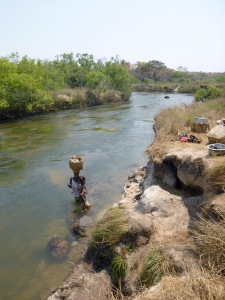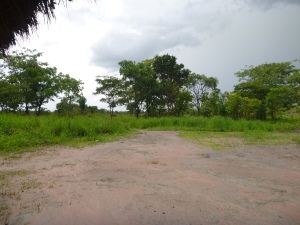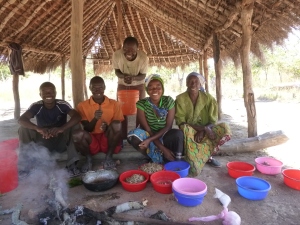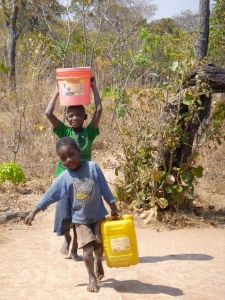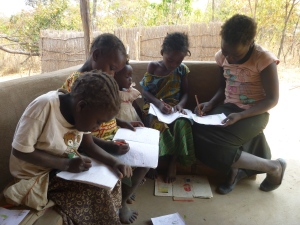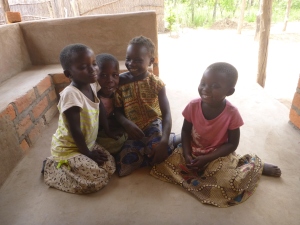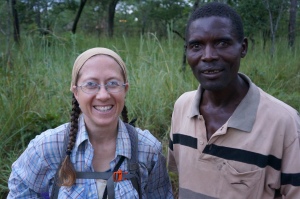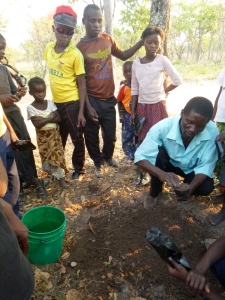When I set up my home in rural Zambia, I expected the small village of Mfuba to be my universe – my reference point for what defines “rural Zambia.”
But as it turns out, there are a lot of us PCVs here – more than 280, last I heard – and each of us, in each of our individual villages, has discovered our own definition of “rural Zambia.”
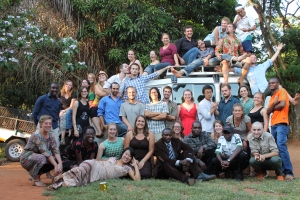
PCVs (and staff) of Northern and Muchinga provinces, at our semiannual provincial meetings. Each one of our experiences has been shaped by a unique village placement.
According to the Peace Corps Annual Volunteer Survey, Zambian PCVs’ sites remain the most rural and “undeveloped” of any where the organization serves. Yes, this means almost all of us live that stereotypical Peace Corps experience – the one that barely exists anymore, but remains what most people imagine: thatched-roof, mud huts with no electricity or running water, in far-flung communities with limited transport options to the nearest town.
But within this basic framework, the differences among villages where we serve are infinite.
Mfuba has about 90 households – probably between 800 and 900 people total living in homes spaced some distance apart, with lots of trees in between. Other Zambian PCVs may live on a compound with just one other family, with their next-nearest neighbors a couple of kilometers away; or in a densely populated area, with several other houses right up against their own front yards. PCV host villages can range from just five or six homes with only a few dozen residents up to nearly 10,000 people in a single large village.
(If you want to know more about what life is like for PCVs in other countries, check out my friend Hannah’s blog. She’s trying to interview a PCV from every country where Peace Corps currently serves!)
Of course, I can ride my bike in just about any direction and visit a never-ending string of different villages, but spending time in a community where a PCV serves opens doors in a different way. Typically, that PCV has a ready-made circle of family, friends, and kids who will want to come over and hang out. He or she can act as tour guide and interpreter, opening up whole new worlds I’d never experience otherwise.
In all, I’ve visited 21 Zambian PCVs in their home villages. This includes Peace Corps-sponsored First Site Visit and Second Site Visit, as well as vacation time and days spent collaborating on work projects with my nearest neighbors.
Every community I’ve seen has been unique, reminding me that no two PCVs’ experiences are ever alike. An accident of geographical placement can have a huge effect on one’s time in Zambia.
Dan lived with neighbors packed right up against him – even though he lived 76 kilometers from the tarmac – while Scott has quite a bit of privacy in his yard, in spite of living just three kilometers from the sprawling town of Mpika. (You can see city lights from his yard at night. Whoa!)
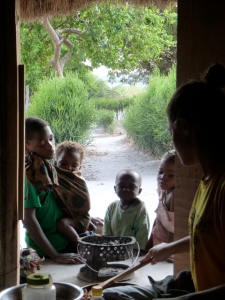
When we visited Dan’s place for Independence Day, neighboring kids crowded right up into the doorway to watch Erica cooking.

At Scott’s site, Adam and Zach enjoy pizza – brought in by bicycle from just 5 Km away – and hair-braiding services.
Gordon’s site – like many in Eastern Province – boasted lots of climb-able rock outcrops, few trees, and high population density.
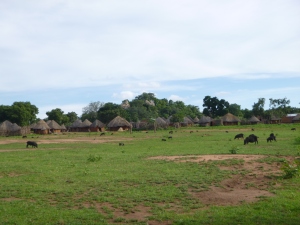
Looking across the soccer (aka bola) pitch at the closely spaced homes of Gordon’s village, Chimutanda.
Kate lives a short walk from a beautiful lake – but an even shorter distance from a rowdy bar that has negatively affected her service.

A traditional canoe on the shore of Lake Lusiwasi, in Kate’s backyard. This tranquil scene contrasts sharply with the thumping music and drunken banter at the nearby bar.
Taylor lives in the same vil’ as the Chieftainess, so she has government services and tuck shops galore – even though she is 56 kilometers of awful dirt road away from the nearest town. Morgan, on the other hand, hangs his hat only 17 kilometers from the tarmac, but his community is about as isolated as it gets: at the end of a dead-end road, its one primary school only built in 2006. Oh, and his neighbors found a hippo eating their crops last year.
Jim and Julie’s village – 45 kilometers from the nearest paved road – felt like a town to me. They have two lodges, an auto repair shop, and tuck shops that sell cold beverages and Kellogg’s Corn Flakes!
Luke lives between the Great Northern Road, which runs from Lusaka up to Northern Province, and the Zambia-Tanzania railway line, so he’s gotten used to the sounds of trains and big trucks barreling by all night. Christina’s home is just two kilometers from a good-sized town, so she can buy fresh vegetables every day, but she will never, ever know everyone in her community.
Faye’s community also felt a little overwhelming when I first biked in, what with the huge coffee plantation and processing plant. But the village where she actually LIVES, 3 kilometers away, feels as small and remote as anywhere you’d find.
I’ve visited at least one village in every province where Peace Corps serves, except for Southern Province, only because I haven’t managed to travel there, period. (For the record, this includes: Northern, Luapula, Muchinga, Central, Eastern, and Northwestern provinces. Our few third-year, aka extension, volunteers often live in towns, or even in the capital of Lusaka, but that’s a much different experience.)
But the majority of villages where I’ve spent a night or two – 12 of the 21 I’ve visited – have been right here in Northern province, within the two districts that my own community straddles: Kasama and Luwingu.
Even within such a relatively small area, differences can be huge.
Though I’ve so far mostly mentioned physical differences, cultural and demographic characteristics typically have a much bigger impact on a PCV’s service. (So do the race, gender, and sexual orientation of a volunteer, but that’s a whole other post.)
Poverty and education levels vary wildly within the broad category of “rural Zambia.” Kids at some sites are visibly undernourished and neglected, while others look fine save for tattered clothes.
In some villages, most kids don’t even make it to school; in others, a secondary school is within walking distance, and attendance at the primary level is at least decent.
PCVs in some areas work with commercial, export-oriented farmers who hire local workers. Elsewhere, meeting a farmer who tills more than two hectares (five acres) is rare, because all work is done by hand, with hoes.
Some PCVs live right up against Angola, the Democratic Republic of Congo, Malawi, or Tanzania, with all the resultant cultural and social exchanges that entails.
When we first arrived in Zambia, each of us had our own vision of what life in a rural African village might look like. Some of us got more or less what we pictured. Others, not so much.
But by and large, we’ve all made our peace, and our homes, regardless of where we’ve found ourselves.
The following is a sampling of photos I’ve taken in various Zambian PCVs’ home villages:
